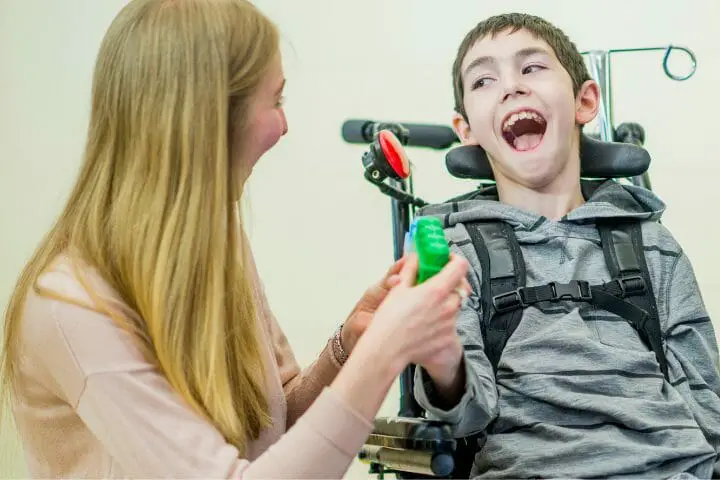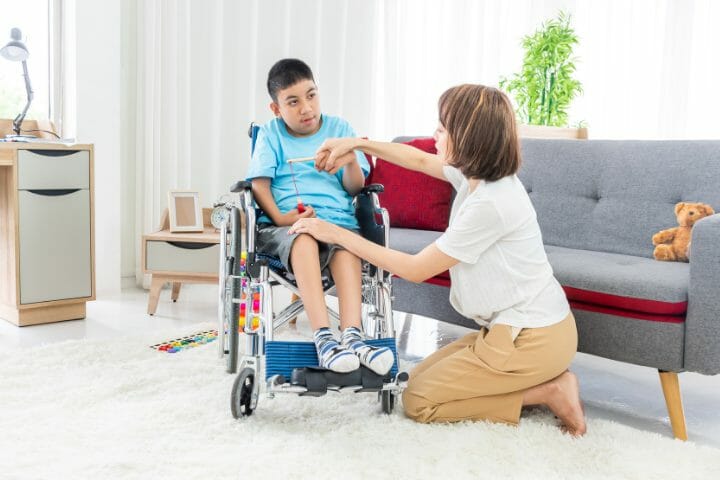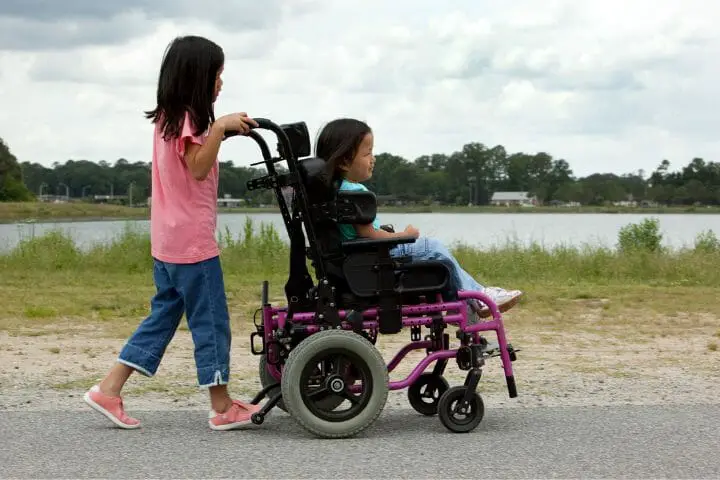In this article, we share some things that will help you in parenting a child with intellectual disability, such as how to care for your child, educational considerations and answers to some common questions that parents have.
Contents
Every year, 6.5 million children are diagnosed with some kind of Intellectual or Developmental Disability (ID) (formerly also known as mental retardation). The average age of the diagnosis is around the age of 6 when a child starts going to school or taking their first steps in a social environment.
So even though the subject is considered taboo and not discussed openly, it is high time to change that. Intellectual disabilities among children are more common than we think it is and it is a problem that parents of children have to deal with.
It requires an open discussion at individual and community levels that can make the blending-in process so much easier for the people who just need a little more help from the larger population.

There is no one definition of intellectual disability, as it is a complex and multi-dimensional condition. However, it is generally defined as a disability that manifests before the age of eighteen and is characterized by significant limitations in both intellectual functioning and adaptive behavior.
This means that individuals with intellectual disabilities have difficulty with activities of daily living, such as dressing or bathing, and also have difficulty with more complex tasks, such as reasoning or planning.
What is Intellectual Disability?
What Causes an Intellectual Disability?
There are a variety of causes of intellectual disability in children. These can include
- Genetic conditions
- Birth defects
- Infections during pregnancy
- Problems with the development of the brain or nervous system.
In some cases, the cause is unknown.
Intellectual disability can also be caused by genetic conditions, such as
- Down syndrome
- Fragile X syndrome, and
- Williams syndrome.
Treatment for intellectual disability depends on the underlying cause. In some cases, there is no specific treatment, but early intervention and support services can help children and adults with the condition to reach their fullest potential.

What are the signs of intellectual disability in children?
Most children with an intellectual disability have a below-average IQ. This means that they may have difficulty learning and understanding new things, and may take longer to learn to speak, walk and take care of themselves. These difficulties can make it hard for them to do well in school and to find a job when they grow up.
Intellectual disability can be mild, moderate, or severe.
- Mild intellectual disability means that a person has some limitations in intellectual functioning and adaptive behavior. This person is likely to have problems with certain academic skills, such as reading and math. They may also have difficulty understanding social rules and conventions.
- Moderate intellectual disability means that a person has more significant limitations in intellectual functioning and adaptive behavior. This person is likely to have trouble communicating, taking care of their personal needs, and performing everyday activities.
- Severe intellectual disability means that a person has very significant limitations in intellectual functioning and adaptive behavior. This person is likely to need help with all aspects of their daily life.
You might also like to read: The Story of Tamana Chona – The Role of a Caregiver in Bringing Up an Accomplished Special Needs Child.
Diagnosis of intellectual disability
There are a number of ways to diagnose an intellectual disability. One common method is to administer an intelligence test, such as the Stanford-Binet Intelligence Scale or the Universal Nonverbal Intelligence Test.
These tests measure a person’s cognitive abilities and provide a score that can be used to compare someone’s intellectual functioning to that of the general population.
Other common methods for diagnosing intellectual disability include assessing a person’s adaptive functioning and reviewing their medical history. Adaptive functioning refers to the skills a person needs to live independently, such as self-care, communication, and money management.
A review of a person’s medical history can help rule out other conditions that may be causing symptoms similar to those of an intellectual disability. A diagnosis of intellectual disability is made when a person has significantly impaired intellectual functioning and adaptive skills.
The exact criteria used to make this diagnosis can vary depending on the source, but generally, a person must have an IQ score that is two standard deviations below the mean and significant difficulties in at least two adaptive skills areas.

Treatment for an Intellectual Disability
Intellectual disability is a lifelong condition. There is no cure, but there are ways to help people with the condition live happy and fulfilling lives. With the right support, they can learn new skills, make friends, and participate in their communities.
Parents of children with IDs need to recognize that every child who is growing up with intellectual disabilities has their own unique needs. However, there are a number of effective interventions and therapies that can help people with intellectual disabilities to reach their full potential.
One of the most important things that families of children with an intellectual disability can do is to provide a loving and supportive home environment.
It is also important to make sure that intellectually disabled children have opportunities to socialize and participate in activities that they enjoy.
In addition, there are a number of specialized interventions and therapies that can be extremely helpful for people with intellectual disabilities. These include speech and occupational therapies, as well as behavioral interventions.
Can intellectual disability be prevented?
There is no sure way to prevent intellectual disability, but there are things that can be done to reduce the risk. Studies have shown that reducing exposure to environmental toxins, increasing access to early intervention and special education services, and improving nutrition.
Additionally, pregnant women should receive early and regular prenatal care, as this can help identify any potential problems with the developing fetus.
There is no known cure for intellectual disability, but there are a variety of treatments available that can help people with the condition manage their symptoms and improve their quality of life.
These treatments can include special education services, speech, and occupational therapy, and medications to treat associated conditions such as ADHD or anxiety.
Additionally, parenting a child with an intellectual disability requires support from family and friends is essential for people with intellectual disabilities, as it can help them lead fulfilling and meaningful lives.

Common Coexisting Conditions in Children with ID
Intellectual disabilities can co-occur with other conditions, which may complicate diagnosis and treatment.
Some of the most common co-existing conditions include:
- Attention Deficit Hyperactivity Disorder (ADHD)
- Anxiety and other psychiatric disorders
- Depression
- Cerebral Palsy
- Autism spectrum disorder
- Obsessive-compulsive disorder (OCD)
- Tourette syndrome
You might also like to read: Outdoor Activities for Mentally Disabled Adults
Caring for Your Child
Babies and toddlers
Intellectual disabilities can present a number of challenges when caring for babies. However, with a little planning and patience, you can provide the best possible care for your little one.
Here are some tips to consider when caring for a baby with an intellectual disability:
- Be patient: Babies with intellectual disabilities can take longer to learn new things and reach developmental milestones. It is important for mothers of children with ID to give your baby time to learn at their own pace.
- Use visual aids: Visual aids such as pictures, flashcards, or videos can help babies with intellectual disabilities learn new concepts.
- Encourage social interaction: Social interaction is crucial for babies with intellectual disabilities. Encourage your baby to interact with others through games, songs, and other activities.
- Seek professional help: If you have any concerns about your baby’s development, be sure to seek professional help from a doctor or other healthcare provider.
With a little patience and planning, you can provide the best possible care for your intellectually disabled child.

School going children
There are many things to consider when caring for a school-aged child with intellectual disabilities. In addition to the usual challenges of parenting, you may also need to help your child with things like communication, social skills, and self-care. A few things you need to remember for your child’s care can be:
- Be understanding: It can be frustrating when your child doesn’t seem to understand what you’re saying, but it’s important to remember that they are still learning. Be patient and try to explain things in a way that they can understand.
- Help them communicate: Many children with intellectual disabilities have difficulty communicating. You can help by teaching them to sign language or using picture cards to help them express their needs.
- Encourage social skills: It’s important for children with intellectual disabilities to learn social skills. You can help by teaching them a simple social skill such as how to greet people, how to start a conversation, and how to ask for help.
- Help them become independent: One of the best things you can do for your child is to help them become as independent as possible. This includes teaching them how to dress, how to brush their teeth, and how to eat by themselves.
- Seek out support: Parenting a child with intellectual disabilities can be challenging, so it’s important to seek out support from other parents, and professionals such as teachers, therapists, and doctors. There are also many online resources available to help you.

What Are Educational Considerations For ID Children?
There is no one-size-fits-all answer to this question, as the educational needs of children with intellectual disabilities vary greatly.
However, there are some general principles that can guide individuals who are parenting a child with intellectual disabilities, as well as educators in making decisions about the best educational path for a child with an intellectual disability.
- It is important to remember that all children are unique and should be treated as individuals. No two children with intellectual disabilities will have exactly the same needs, so it is important to tailor an educational plan to fit the specific child.
- Set realistic expectations for a child with an intellectual disability. It is important to remember that a child with an intellectual disability will likely never achieve the same level of academic or intellectual achievement as a typically developing child. However, it is still important to set high expectations for a child with intellectual disabilities in order to challenge them and help them reach their full potential.
- They have to be provided with a supportive and inclusive educational environment that is fit for a child with an intellectual disability. A child with an intellectual disability should feel like a valued member of the class and should be given opportunities to participate in all aspects of the curriculum.
- Finally, it is important to remember that children with intellectual disabilities grow and develop at their own pace. As someone who is parenting a child with an intellectual disability, it is important to be patient and to allow a child to progress at his or her own speed.
You might also like to read: Gifts for Adults with Downs Syndrome
Children’s ID – impact on parents and caregivers
The impact of children’s intellectual disabilities on parents and caregivers can be significant. Parental stress, anxiety, and depression are common among parents of children with developmental disabilities. They may also experience social isolation and financial hardship depending on factors such as socioeconomic status and their own level of education.
Many caregivers feel that they are not supported by family, friends, or the wider community. As a result, they can find it difficult to cope with their caring responsibilities. It is important to remember that caregivers are often working hard to provide care and support for their children, and they should be given the same level of supporting themselves.
If you are a caregiver or parenting a child with disabilities, make sure you take care of yourself as well as your child. It is also important to have the right resources to find information and help to take care of your children whenever you need them.
Seek out support from family, friends, and professionals to help you through the tough times. and always remember, you are not alone! There are several government and community based interventions for parents of children with developmental disabilities

Frequently Asked Questions
How do you discipline a child with an intellectual disability?
Children with any form of intellectual disability will require a different approach to discipline. Try to avoid using physical punishment, as it can be ineffective and may further damage the child’s self-esteem.
Keep communication simple and clear, as the child may have difficulty understanding complex concepts. Patience is always the key. It may take longer for the child to learn new concepts or follow instructions, so you have to give them the time to learn and grow.
What effect does having a parent with an intellectual disability have on a child?
The effect of having a parent with intellectual disabilities will vary depending on the individual child and parent involvement. Some potential effects could include feeling embarrassed or ashamed of the parent, feeling isolated or alone, or having difficulty in school.
It is important to remember that each child will react differently and with the right communication, the relationship can be managed well.
Can people with intellectual disabilities raise children?
Some people with intellectual disabilities are able to parent children successfully with the help of supportive services and trained professionals. Others may need more intensive services and support in order to parent safely and effectively.
There are many resources available to help parents with intellectual disabilities learn the skills they need to be successful. With the right support in place, anyone can be a great parent.
What are 3 intellectual disabilities?
3 types of intellectual disabilities are
Autism Spectrum Disorder
Down’s Syndrome
Fragile X Syndrome.
What does mild intellectual disability look like?
People with mild intellectual disabilities are able to lead relatively normal lives, although they may need some assistance and support.
Some common signs of mild intellectual disability include below-average IQ scores, difficulty with academic subjects such as reading, writing, and math, difficulty understanding abstract concepts, poor planning and organizational skills, impulsive behavior, and poor social skills. These could be early signs of intellectual disabilities that should be checked by a qualified professional.
What IQ is a mild intellectual disability?
There are three ranges of IQ that are considered for intellectual disabilities: 50-55 and lower than 70 for Mild, 35-40 to 50-55 for Moderate, 20-25 for Severe, and less than 20-25 for Profound.
Can intellectual disability improve?
There is no cure for any type of intellectual disability. Since the condition manifests at a very young age, it is possible to manage it from the beginning. Children with intellectual disabilities need the right kind of help and assistance to have a normal life.
Wrap Up
An Intellectual Disorder does not have to mean a life in the shadows for your little one. With the right guidance, support, encouragement and understanding, children with IDs have outshined others.
We hope we were able to cover topics that you were interested in reading. Do let us know how we did, and ask us any further queries that you might have on the topic. Thank you for reading.
